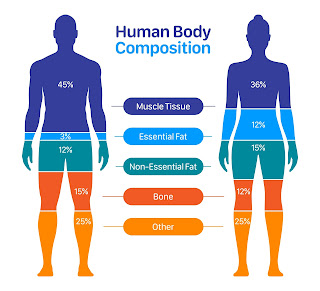Understanding The Difference Between Weight Loss & Fat Loss
Understanding the difference between weight loss and fat loss is crucial for developing a healthy approach to managing your body composition. Here are a few things to consider:
Weight Loss
This refers to the reduction in overall body weight, which can occur due to various factors, including loss of water weight (from eating less starchy carbohydrates) being dehydrated, loss of muscle mass (which we want to avoid at all costs)! and loss of body fat.
It is a broad term that doesn't specifically target fat reduction. It's a method to see the scale number go down at all costs! When you engage in weight loss strategies, you will experience fluctuations in weight due to factors such as water retention (hello being a woman!) increased/decreased food volume and increased/decreased glycogen levels.
Fat Loss
On the other hand, this specifically refers to a reduction in body fat stores. It involves losing excess adipose tissue while preserving muscle mass. Especially important if you are a peri/menopausal woman. Fat loss is a more desirable outcome than weight loss alone, as it leads to improved body composition, aesthetic and overall health. Fat loss also requires PATIENCE! True fat loss is slow and steady, anyone can drop 1.5kg of water in a week but how do you react when that becomes 0.5kg? A fat loss phase should have a start and end date and a maintenance plan when it ends.
Body Composition Matters
The scale cannot differentiate between weight loss and fat loss. It is important to consider body composition, which refers to the proportion of body fat, muscle, bone and other tissues in the body. Two individuals can have the same weight but look completely different. This is why it is important to focus on reducing body fat rather than just aiming for an arbitrary number on the scale. Use regular measurements, photos and track your workout progress to see if you are moving closer to your goals. The scale will trend down, slowly, over time if you are losing body fat. You will not lose 1kg of body fat overnight but you can see a wild fluctuation in your body weight for lots of reasons.
Sustainable Approaches
Fad diets and extreme weight loss may lead to rapid weight loss but they you will also see muscle loss and a rebound in weight over time. A sustainable approach to fat loss involves eating the highest number of calories whilst also seeing progress, good levels of daily activity, resistance training and rest. This approach promotes gradual fat loss whilst preserving muscle and overall health.
If your dramatic diet has to be repeated every few months, you need to work on a new strategy.
Health Implications
Excessive fat accumulation around the abdomen, can increase the risk of various health conditions, such as heart disease, type 2 diabetes, and certain cancers. Focusing on fat loss rather than solely weight loss can can contribute to better long-term health outcomes and reduces the risks of these outcomes.
Non-Scale Victories
While the scale is still a common metric to measure progress, it's essential to consider as many other measures of progress as possible, Things like improved energy levels, increased strength, increased fitness, better sleep quality, positive changes in body measurements and how your clothes fit are all good indicators of fat loss progress even if the scale doesn't show progress. It is entirely possible to be losing body fat but having it masked (in the short term, 3-4 weeks by body weight fluctuations.)
In summary Weight Loss and Fat Loss are entirely distinct concepts. While Weight Loss involves a reduction in overall body weight, fat loss specifically targets reducing excess body fat whilst preserving or building muscle mass.
Prioritizing Fat Loss over Weight Loss will lead to improved body composition and long-term health outcomes x



Comments
Post a Comment